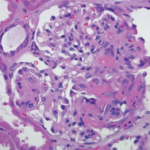A Phase 3 study of the anti-IL5 antibody mepolizumab for EGPA is now underway, and the results might help further clarify the differences between the two subsets, Dr. Kallenberg said. Results are expected next year.
In another important development, recent studies looking at ANCA and other autoantibodies in infectious endocarditis and endocarditis-associated glomerulonephritis have found forms of ANCA were present more than a quarter of the time.1,2
“The lesson is, exclude infective endocarditis in every patient suspected of ANCA-associated vasculitis (AAV),” Dr. Kallenberg said.
In ANCA-associated vasculitis (AAV), the therapeutic aim of treatment without steroids could be coming closer to a reality. A Phase 2 study in AAV of the complement 5a receptor inhibitor, CCX168, compared those taking the drug with steroids to those taking the drug without steroids. Researchers found that a similar number in each group (86% vs. 81%) saw at least a 50% reduction in Birmingham Vasculitis Activity Score.3
A large, multi-center, international prospective study—the DCVAS study—is underway to design & validate classification & diagnostic criteria for vasculitis.
Systemic Sclerosis
John Varga, MD, director of the Northwestern Scleroderma Program, reviewed recent developments in precision treatment, genetics and treatments in systemic sclerosis.
A study published last year underscores the potential to select patients more effectively for certain treatments. The PANTHER trial in 2014 concluded that the amino acid N-acetylcysteine was no better than placebo in people with idiopathic pulmonary fibrosis. But a closer look at data from that trial, using genetics, found that those with a certain single nucleotide polymorphism (SNP) in the TOLLIP gene benefited, while in those with another it actually seemed to be harmful.4
Dr. Varga called this “one of the most intriguing and remarkable examples of precision medicine.”
Over the past year, research has shed new light on genetic variants that appear to have harmful effects related to systemic sclerosis. A new mutation identified in the phospholipid transporter gene ATP8B4, already identified as a risk for Alzheimer’s, also appears to be a damaging mutation in systemic sclerosis, but the function and the mechanism of action of this mutation aren’t known yet.5
A forthcoming study out of the University of California San Francisco using whole exome sequencing in diffuse cutaneous systemic sclerosis identifies several more mutations that appear damaging, but the effects of these are unknown as well.
So the challenge in this area, Dr. Varga said, will be to “establish the function and pathogenic role of genetic variants.”


